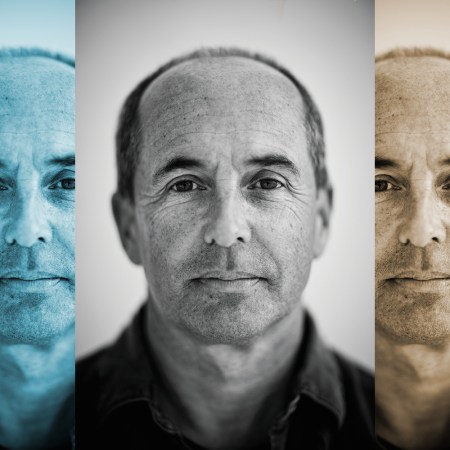The Bureau of Alcohol, Tobacco and Firearms (ATF) and the FBI were in the wrong. They wielded man- and firepower like a caveman swings a club.
David Koresh was a dangerous man, possibly a psychopath. Children from the compound reported he was also a sexual predator.
When it comes to discussing the 51-day standoff in 1993 between the feds and Koresh’s Branch Davidian sect in Waco, Texas, you can say the government was wrong and Koresh was a monster and both will be true.
To be fair to the Paramount Network, whose Waco TV series premiered Wednesday night, the show hasn’t completed its six-episode run. But interviews of Drew and John Erick Dowdle—the brothers who brought the series to life—make it clear they are presenting a sympathetic portrait of both Koresh (Taylor Kitsch) and members of his isolated religious compound.
While members of the Branch Davidians do deserve a huge measure of compassion and sympathy, it’s much more difficult to excuse depicting Koresh as a doomed good guy facing the government’s might.
And it seems clear the Dowdles do see Koresh in a sympathetic light. Speaking of reading the book upon which much of their series is based— Waco: A Survivor’s Story, by ex-Branch Davidian David Thibodeau—Drew Dowdle told Newsweek that “part of the fascination” for he and his brother was that “here was this severely abused kid, with a stutter and dyslexia, who grew up to be a religious leader. That is incredible.”
In the book, Dowdle said, Koresh is revealed by his former follower as “not the evil maniac hell bent on murder that the media created. He had a sense of humor, his sermons were quirky, he played guitar and performed in local bars.”
Another infamous cult leader was also known for his guitar and songwriting abilities: Charles Manson.
Okay, Manson may be an unfair or even inaccurate comparison. There’s a better example to come.
The Branch Davidian compound.There is no doubt that the government deserved most of the criticism leveled after Waco. The final gun battle that ended with the compound in flames and 76 dead began in confusion, and everything after was chaos. As Harvard professor Alan A. Stone, M.D wrote in 1993, the feds’ “overwhelming show of force was not working in the way the tacticians supposed. It did not provoke the Branch Davidians to surrender, but it may have provoked David Koresh to order the mass-suicide.”
So yes, the government essentially triggered this small apocalypse.
But let’s remember what Koresh was really like.
Like many extremely charismatic leaders, Koresh likely was a stone-cold psychopath. Any emphasis on his good qualities ignores the fact that a hallmark of completely antisocial personalities is their ability to cruelly play with the lives around them—and often do it with a great deal of charm.
Writing for Time in 2001, Richard Lacayo noted Koresh’s “creamy charm and a cold-blooded willingness to manipulate those drawn to him.” He quoted UCLA professor Louis West, who emphasized that a psychopath often “quickly wins people’s trust and is uncannily adept at manipulating and conning people.”
There was plenty of evidence this was Koresh to a T.
The most striking element of the way Koresh used and abused his followers was his sexual dominance.
David Karesh.A 1993 article in the New York Times titled “Growing Up Under Koresh: Cult Children Tell of Abuses” goes right to the heart of the argument for Koresh as a man lacking in conscience or morality in one paragraph. His treatment of children under his care said everything:
“David Koresh told them to call their parents ‘dogs’; only he was to be referred to as their father. Girls as young as 11 were given a plastic Star of David, signifying that they had “the light” and were ready to have sex with the cult leader. A team of therapists said these were some of the things that 19 of the 21 surviving children of the Branch Davidian cult had told them about their lives inside the compound.” (Emphasis added.)
This is a fact about Koresh that recurs in multiple accounts of life in the Branch Davidian compound. It came from statements given by children ages 4 to 11 while in the care of the Texas Children’s Hospital—children released by Koresh in the early days of the standoff.
It’s impossible to read of David Koresh giving 11-year-old girls “permission” to sleep with him and feel any sympathy for the man. It’s an added cruelty to his victims to discount such acts by whitewashing him as an antihero on an “incredible” journey.
Branch Davidians, some of them from other countries, came to put their trust in Koresh as a messiah. Everyone who remained in the isolated Waco compound believed he was their guiding light. They deserve sympathy and empathy.
Just like the 900 or more members of the People’s Temple in Jonestown, Guyana were victims worthy of compassion. They truly thought their megalomaniacal messiah Jim Jones would lead them to salvation.
What was the difference between Koresh and Jones? It was just a matter of scale. Even the ultimate triggers for both men to commit mass murder-suicide were similar. For Jones, it was an inspection by California congressman Leo Ryan with a national news team in tow. Jones knew more scrutiny would come, and he might lose members of his flock.
For Koresh, the armored vehicles and agents in military gear both fulfilled a delusion of Armageddon and presented an ultimate threat to his control.
His end was the same as Jones’.
The government made every mistake possible in the Waco standoff. The ATF and FBI held an iron hand balled into a fist and then triggered their own worst-case scenario.
But when you’re watching handsome Taylor Kitsch embody David Koresh as some laughing pocket messiah on Waco, remember that the real man molested children who depended on him. He took everything he could from those with him, wielding their need for faith and belonging like a gun to keep them under control. He was in every way the opposite of a hero.
This article was featured in the InsideHook newsletter. Sign up now.
























